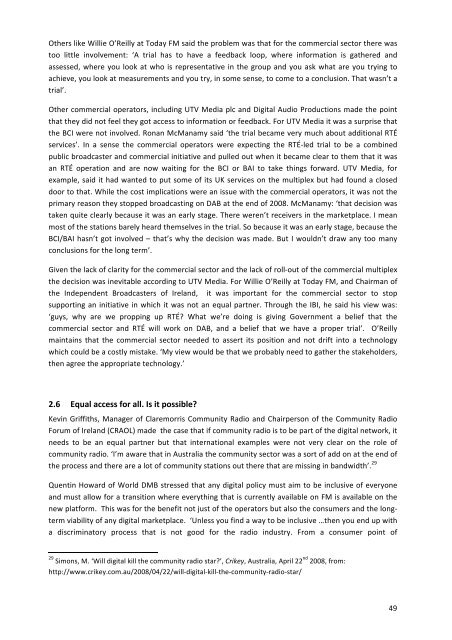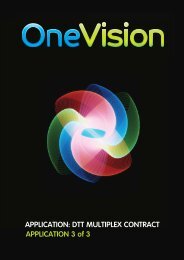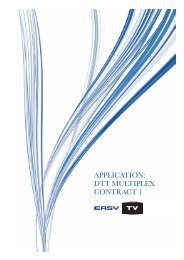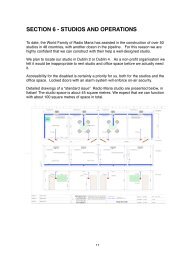Digital Radio for Ireland: Competing Options, Public Expectations - BCI
Digital Radio for Ireland: Competing Options, Public Expectations - BCI
Digital Radio for Ireland: Competing Options, Public Expectations - BCI
You also want an ePaper? Increase the reach of your titles
YUMPU automatically turns print PDFs into web optimized ePapers that Google loves.
Others like Willie O’Reilly at Today FM said the problem was that <strong>for</strong> the commercial sector there was <br />
too little involvement: ‘A trial has to have a feedback loop, where in<strong>for</strong>mation is gathered and <br />
assessed, where you look at who is representative in the group and you ask what are you trying to <br />
achieve, you look at measurements and you try, in some sense, to come to a conclusion. That wasn’t a <br />
trial’. <br />
Other commercial operators, including UTV Media plc and <strong>Digital</strong> Audio Productions made the point <br />
that they did not feel they got access to in<strong>for</strong>mation or feedback. For UTV Media it was a surprise that <br />
the <strong>BCI</strong> were not involved. Ronan McManamy said ‘the trial became very much about additional RTÉ <br />
services’. In a sense the commercial operators were expecting the RTÉ‐led trial to be a combined <br />
public broadcaster and commercial initiative and pulled out when it became clear to them that it was <br />
an RTÉ operation and are now waiting <strong>for</strong> the <strong>BCI</strong> or BAI to take things <strong>for</strong>ward. UTV Media, <strong>for</strong> <br />
example, said it had wanted to put some of its UK services on the multiplex but had found a closed <br />
door to that. While the cost implications were an issue with the commercial operators, it was not the <br />
primary reason they stopped broadcasting on DAB at the end of 2008. McManamy: ‘that decision was <br />
taken quite clearly because it was an early stage. There weren’t receivers in the marketplace. I mean <br />
most of the stations barely heard themselves in the trial. So because it was an early stage, because the <br />
<strong>BCI</strong>/BAI hasn’t got involved – that’s why the decision was made. But I wouldn’t draw any too many <br />
conclusions <strong>for</strong> the long term’. <br />
Given the lack of clarity <strong>for</strong> the commercial sector and the lack of roll‐out of the commercial multiplex <br />
the decision was inevitable according to UTV Media. For Willie O’Reilly at Today FM, and Chairman of <br />
the Independent Broadcasters of <strong>Ireland</strong>, it was important <strong>for</strong> the commercial sector to stop <br />
supporting an initiative in which it was not an equal partner. Through the IBI, he said his view was: <br />
‘guys, why are we propping up RTÉ? What we’re doing is giving Government a belief that the <br />
commercial sector and RTÉ will work on DAB, and a belief that we have a proper trial’. O’Reilly <br />
maintains that the commercial sector needed to assert its position and not drift into a technology <br />
which could be a costly mistake. ‘My view would be that we probably need to gather the stakeholders, <br />
then agree the appropriate technology.’ <br />
<br />
2.6 Equal access <strong>for</strong> all. Is it possible? <br />
Kevin Griffiths, Manager of Claremorris Community <strong>Radio</strong> and Chairperson of the Community <strong>Radio</strong> <br />
Forum of <strong>Ireland</strong> (CRAOL) made the case that if community radio is to be part of the digital network, it <br />
needs to be an equal partner but that international examples were not very clear on the role of <br />
community radio. ‘I’m aware that in Australia the community sector was a sort of add on at the end of <br />
the process and there are a lot of community stations out there that are missing in bandwidth’. 29 <br />
Quentin Howard of World DMB stressed that any digital policy must aim to be inclusive of everyone <br />
and must allow <strong>for</strong> a transition where everything that is currently available on FM is available on the <br />
new plat<strong>for</strong>m. This was <strong>for</strong> the benefit not just of the operators but also the consumers and the long‐<br />
term viability of any digital marketplace. ‘Unless you find a way to be inclusive …then you end up with <br />
a discriminatory process that is not good <strong>for</strong> the radio industry. From a consumer point of <br />
<br />
29 nd<br />
Simons, M. ‘Will digital kill the community radio star?’, Crikey, Australia, April 22 2008, from: <br />
http://www.crikey.com.au/2008/04/22/will‐digital‐kill‐the‐community‐radio‐star/ <br />
49






